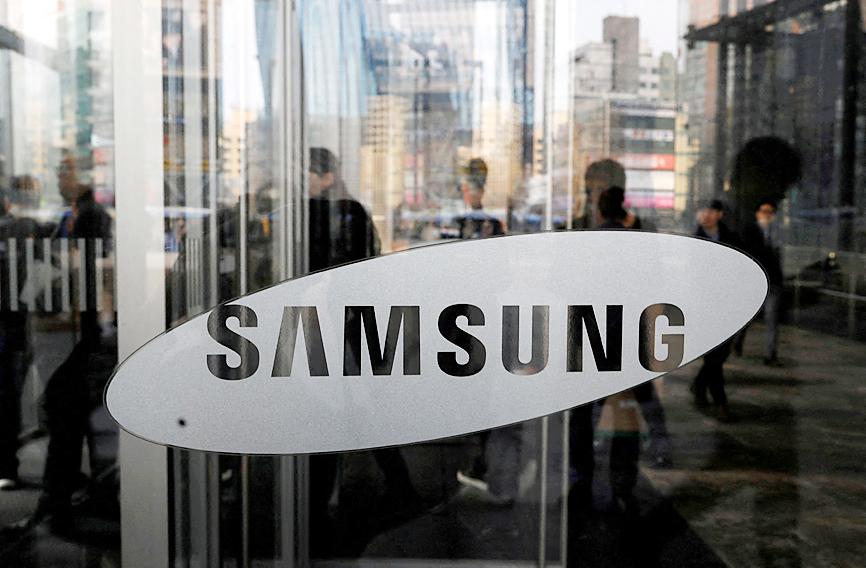Samsung Electronics Co is talking with foundry clients about charging as much as 20 percent more for making semiconductors this year, joining an industry-wide push to hike prices to cover rising costs of materials and logistics.
Contract-based chip prices are likely to rise around 15 percent to 20 percent, depending upon the level of sophistication, people familiar with the matter said.
Chips produced on legacy nodes would face bigger price hikes, while new pricing would be applied from the second half of this year, they said, adding that Samsung has finished negotiating with some clients and is in discussions with others.

Photo: Reuters
Samsung’s decision is a shift from last year’s relatively stable pricing policy, when the industry rushed to raise prices in the wake of a global chip shortage. The company is facing multiple risks such as the war in Ukraine, lockdown measures in China, rising interest rates and inflation. Those are throwing a wrench into business plans typically made a few years in advance.
The move translates into additional pressure on makers of smartphones, cars and game consoles to lift the prices consumers pay. Samsung and Taiwan Semiconductor Manufacturing Co (TSMC, 台積電) account for more than two-thirds of global capacity for outsourced chips.
Costs for chipmakers are now rising at about 20 to 30 percent on average on all fronts, from chemicals, gas and wafers to equipment and construction materials.
Contract chip manufacturers including TSMC and United Microelectronics Corp (UMC, 聯電) are telling clients that they plan to raise prices by a mid-to-high single-digit percentage, on the heels of a price hike several months ago.
Industry leader TSMC has told clients that it plans to raise prices by about 5 percent to 8 percent next year, following a 20 percent price hike last year, the Nikkei said.
UMC is also planning another round of 4 percent price hikes in the second quarter. ASML Holding NV — a key supplier to Samsung and TSMC — warned last month of rising pressure on labor costs, in addition to higher material and transportation costs.
The shortage forces customers to prioritize the ability to procure and secure needed chips over prices. Semiconductor makers have been trying to improve profitability, partly by shifting more weight to high-end chips, said Bloomberg Intelligence analyst Masahiro Wakasugi.
“This is an inevitable move for Samsung,” Wakasugi said. “Some customers may accept higher prices if they can get chips earlier than others.”

Vincent Wei led fellow Singaporean farmers around an empty Malaysian plot, laying out plans for a greenhouse and rows of leafy vegetables. What he pitched was not just space for crops, but a lifeline for growers struggling to make ends meet in a city-state with high prices and little vacant land. The future agriculture hub is part of a joint special economic zone launched last year by the two neighbors, expected to cost US$123 million and produce 10,000 tonnes of fresh produce annually. It is attracting Singaporean farmers with promises of cheaper land, labor and energy just over the border.

US actor Matthew McConaughey has filed recordings of his image and voice with US patent authorities to protect them from unauthorized usage by artificial intelligence (AI) platforms, a representative said earlier this week. Several video clips and audio recordings were registered by the commercial arm of the Just Keep Livin’ Foundation, a non-profit created by the Oscar-winning actor and his wife, Camila, according to the US Patent and Trademark Office database. Many artists are increasingly concerned about the uncontrolled use of their image via generative AI since the rollout of ChatGPT and other AI-powered tools. Several US states have adopted

KEEPING UP: The acquisition of a cleanroom in Taiwan would enable Micron to increase production in a market where demand continues to outpace supply, a Micron official said Micron Technology Inc has signed a letter of intent to buy a fabrication site in Taiwan from Powerchip Semiconductor Manufacturing Corp (力積電) for US$1.8 billion to expand its production of memory chips. Micron would take control of the P5 site in Miaoli County’s Tongluo Township (銅鑼) and plans to ramp up DRAM production in phases after the transaction closes in the second quarter, the company said in a statement on Saturday. The acquisition includes an existing 12 inch fab cleanroom of 27,871m2 and would further position Micron to address growing global demand for memory solutions, the company said. Micron expects the transaction to

A proposed billionaires’ tax in California has ignited a political uproar in Silicon Valley, with tech titans threatening to leave the state while California Governor Gavin Newsom of the Democratic Party maneuvers to defeat a levy that he fears would lead to an exodus of wealth. A technology mecca, California has more billionaires than any other US state — a few hundred, by some estimates. About half its personal income tax revenue, a financial backbone in the nearly US$350 billion budget, comes from the top 1 percent of earners. A large healthcare union is attempting to place a proposal before